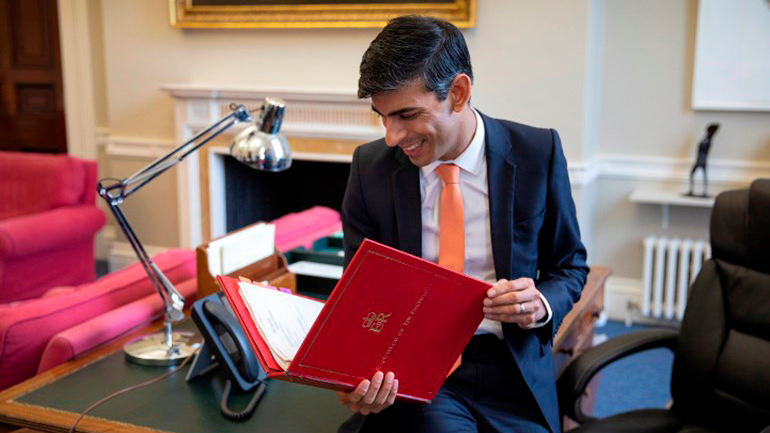Energy news round-up: energy bills could be reduced if lobby group is successful
What’s been happening in the energy industry this week? Here’s our energy news round-up

Sign up for breaking news, reviews, opinion, top tech deals, and more.
You are now subscribed
Your newsletter sign-up was successful
We've seen a lot of news about energy bills in the last few days, including a proposal from Ofgem to prevent energy suppliers from overcharging customers. Meanwhile, a raft of exciting new tech could revolutionise the energy sector, with scientists claiming to have successfully harvested energy from rain, plus news about Tesla's 'million mile' EV battery. Here's what happened this week in energy...
Chancellor urged to increase green energy spending to reduce bills
A coalition of organisations across the UK is to lobby Chancellor Rishi Sunak to spend £5 billion on renewable energy and energy efficiency. The group, which includes energy companies Siemens and EDF, commissioned a report that was presented to Energy Minister Kwasi Kwarteng this week.
According to the group, unlocking private sector investment would generate a return of £100 billion for the British economy. Some £40 billion of this could be used for energy efficiency improvements, which would help people reduce their energy bills.
“This would help hard-pressed consumers save on their fuel bills, support hundreds of thousands of jobs and protect the environment,“ said Polly Billington, director of local authority network UK100.
In the meantime, a good way to reduce your energy bills is to run an online energy comparison to find the best energy deals in your area, and switch while energy prices are still low following the pandemic.
- Reduce your energy bills: compare gas and electricity prices now
- Read more: Renews
Ofgem plan to cut bills criticised by energy firms
Proposals by industry regulator Ofgem to cut household energy bills and spend more on green energy have been heavily criticised by energy firms in the UK.
Under the plans, energy bills could be cut by £20 per year, while energy companies would commit to spending £25 billion over five years on green energy. However, the plans also mean that profits generated from energy companies' investments will be nearly halved.
Sign up for breaking news, reviews, opinion, top tech deals, and more.
National Grid, SSE and Scottish Power all said that the regulator's plans were flawed. The National Grid also warned that the plan would reduce its ability to deliver resilient and reliable energy networks, and hamper the energy transition and green recovery.
However, Citizens Advice said the move could put an end to energy firms "overcharging energy customers by billions of pounds".
- Read more: BBC News
Tesla’s 'million-mile' battery could arrive this year
A battery produced by Tesla that could power electric vehicles (EVs) for more than one million miles could become available as soon as this year, or early 2021. According to the U.S. Department of Energy, most manufacturers of electric vehicles currently offer 100,000-mile warranties for their batteries, reports OilPrice.com, while Nissan provides additional battery capacity loss coverage for five years or 60,000 miles.
The longer-lasting battery is intended to last longer than the vehicle it powers, and is part of a wider plan to bring EV prices in line with those of conventional gas-powered cars.
The million-mile battery wouldn't just boost EV ownership, however, or the resale value of EVs. The lithium-ion battery cell chemistry is also expected to last at least two decades in grid energy storage, giving a boost to the renewable energy generation sector too.
- Read more: OilPrice.com
Rain drops could power wearables
Scientists from the University of Twente and South China Normal University claim to have designed technology that can generate electricity from moving water droplets. In tests, the 'Charge Trapping Electricity Generator' (CTEG) was able to convert nearly 12 per cent of the mechanical energy of a droplet into electrical energy.
The new method of generating electrical energy from mechanical energy could be applied to more than just rain, and may have implications for everything from consumer tech to science. “Our method can also be considered for other applications where mechanical energy needs to be converted into electrical energy, for example in wearables, from tidal waves, or for sensing,” said Niels Mendel, one of the authors of the new research.
- Read more: Oil Price dot com
National Grid begins work on Viking cable
National Grid has started to build onshore infrastructure for the Viking Link high-voltage direct-current (HVDC) interconnector cable, which will link the UK with Denmark. Siemens Energy has kicked off the project by constructing a 2.4 kilometre access road to the UK converter station, to be located at Bicker Fen in Lincolnshire, which will take nine months to complete.
Siemens will also be constructing the converter station itself, along with another converter station in Denmark. The 765 kilometre, two billion euro interconnector will eventually be able to transport 1.4 gigawatts of energy. It is due to start transporting energy in late 2023.
- Read more: Renews
Find the best energy deal for your home
TechRadar has partnered with MoneySupermarket to help you find the best energy deals in your area. Our energy comparison tool takes less than five minutes to use, and could save you hundreds on your energy bills. Save money now

Robin is a freelance journalist specialising in renewable energy, environmental issues, climate change and transport. He's written for Renewable Energy Magazine for almost a decade, covering all sub-sectors of the global renewable industry - from onshore and offshore wind, solar PV and solar thermal energy, to biomass, anaerobic digestion (AD), geothermal, energy efficiency and smart technology, electric vehicles and hybrids, and much more.
